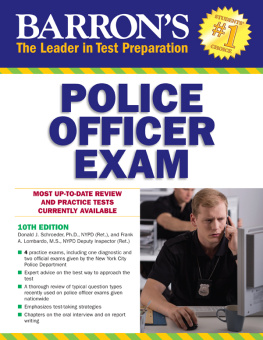EFFECTIVE POLICE SUPERVISION STUDY GUIDE
Good police officers are often promoted to supervisory positions with little or none of the training it takes to be a good manager. An understanding of group behaviors and organizational dynamics is necessary to grasp the fundamentals of managing police officers. The Effective Police Supervision Study Guide coordinates with the core text used in many college-level classes and police departments to teach supervisory practices in criminal justice. This study guide prepares both students and professionals for academic or promotional exams, offering them an opportunity to fully review the material so that they are well-prepared for testing.
This new edition, like the new edition of the textbook it accompanies, includes information on the following topics: police accountability, police involvement with news media, the challenges of dealing with social media, updates on legal considerations, and ways to respond to current issues facing law enforcement with COVID-19 and managing protests.
Chris Rush Burkey is an Assistant Professor in the Criminal Justice and Criminology Department at East Tennessee State University. She received her B.A. and M.A. in Criminal Justice and Criminology from East Tennessee State University and Ph.D. in Criminal Justice from the University of Arkansas at Little Rock. She has published books and book chapters, as well as articles in peer-reviewed journals, including Deviant Behavior and Violence & Gender, and has worked with agencies handling program evaluation, prisoner re-entry, forensic training, and investigative policies and regulations.
Larry S. Miller is a Professor in the Department of Criminal Justice and Criminology at East Tennessee State University. A former law enforcement officer and crime laboratory director, Miller has authored or co-authored seven textbooks, including Police Photography, Crime Scene Investigation, Report Writing for Criminal Justice Professionals, and Effective Police Supervision. His research interests and journal publications are in the areas of policing and forensic science.
Michael C. Braswell is a Professor Emeritus at East Tennessee State University. He began his career as a prison psychologist and earned his Doctorate in Counseling Psychology from the University of Southern Mississippi in 1975. He joined the Department of Criminal Justice and Criminology at ETSU in 1977, where he taught classes on Ethics and Justice, Human Relations and Criminal Justice, and Film Studies in Crime and Justice. He is widely published, and his textbook Justice, Crime, and Ethics is particularly influential in the field of criminal justice.
Ninth edition published 2021
by Routledge
52 Vanderbilt Avenue, New York, NY 10017
and by Routledge
2 Park Square, Milton Park, Abingdon, Oxon, OX14 4RN
Routledge is an imprint of the Taylor & Francis Group, an informa business
2021 Taylor & Francis
The right of Chris Rush Burkey, Larry S. Miller & Michael C. Braswell to be identified as authors of this work has been asserted by them in accordance with sections 77 and 78 of the Copyright, Designs and Patents Act 1988.
All rights reserved. No part of this book may be reprinted or reproduced or utilised in any form or by any electronic, mechanical, or other means, now known or hereafter invented, including photocopying and recording, or in any information storage or retrieval system, without permission in writing from the publishers.
Trademark notice: Product or corporate names may be trademarks or registered trademarks, and are used only for identification and explanation without intent to infringe.
First edition published by Anderson 1990
Eighth edition published by Routledge 2017
Library of Congress Cataloging-in-Publication Data
Names: Rush Burkey, Chris author. | Miller, Larry, 1953 August 26 author. | Braswell, Michael, author.
Title: Effective police supervision study guide / Chris Rush Burkey, Larry S. Miller & Michael C. Braswell.
Description: 9th edition. | New York, NY : Routledge, 2021. | Includes bibliographical references and index.
Identifiers: LCCN 2020042125 (print) | LCCN 2020042126 (ebook) | ISBN 9780367260583 (hardcover) | ISBN 9780367265892 (paperback) | ISBN 9780429294044 (ebook)
Subjects: LCSH: PoliceSupervision of.
Classification: LCC HV7936.S8 M67 2021 (print) | LCC HV7936.S8 (ebook) | DDC 363.2/2dc23
LC record available at https://lccn.loc.gov/2020042125
LC ebook record available at https://lccn.loc.gov/2020042126
ISBN: 978-0-367-26058-3 (hbk)
ISBN: 978-0-367-26589-2 (pbk)
ISBN: 978-0-429-29404-4 (ebk)
Typeset in Garamond, Helvetica Neue, Optima and Stone Serif
by codeMantra
Chapter Summary
I Transition to First-Line Supervisor
The first-line supervisor is at the organizational focal point between line officers and other police managers. It is important to learn the positive aspects of reaching the position of first-line supervisor and also be able to understand why the first-line supervisors position is not for everyone, by examining the negative aspects of the position. Good supervisors do not just happen; they must be cultivated. The first-line supervisor has become an important part of management who is responsible for improving the quality of work life.
Police work has become more and more complex, and it seems reasonable that problems facing todays officers will only increase the complexity of the job. The supervisor must respond with imagination and innovation. One of the most difficult new duties facing the supervisor is being an effective disciplinarian. The supervisor must learn to meet the needs of both officers and the organization, developing a wide range of skills.
II Supervisory Skills
Once an officer assumes the position of a first-line supervisor, his or her role changes drastically and tasks become managerial. It is a supervisors responsibility to emphasize the development of subordinates skills, rather than doing everything himself or herself. In order to maximize effectiveness, a supervisor must attain objectives through the efforts of others by becoming operationally effective in one or more of the following skill areas, known by the acronym





